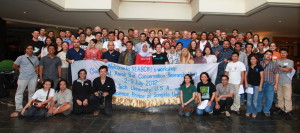The main objective of the 2012 workshop was to bring together people with existing expertise and interest in the SEABCRU priority research and conservation areas to work together to:
- Share experiences among participants and countries in addressing the different priorities
- Refine research and training protocols that can provide for better integration and synthesis of research across the region.
- Link research processes and outputs with conservation efforts in and among SE Asian countries
- Work to collate current data on distribution and abundance of SE Asian bats; inform database development and parameterization
- Identify future directions for research within and across priorities
- Network expertise across countries
Based on the workshop objectives, participants were nominated by the steering committee and students, with additional participants selected from an open application system. Participants were selected based on their conformity to the following criteria:
- Already conducting research or working within the priorities
- Able and likely to contribute to the workshop and to use what they learn from the workshop
- Able and willing to share what they learn from the workshop with a broader group when they return to their host institution
- Able and willing to share data now and in the future
- Committed to the ideals of the SEABCRU
In addition to the Steering Committee and Students, there were 47 participants, 13 for the Cave-Bat Conservation group, 15 for the Flying Fox Conservation group, 11 for the Forest-dependent bats, and 8 joined the Taxonomy and Systematics team. Participants came from Cambodia, Indonesia, Laos, Malaysia, Philippines, Singapore, Thailand, Vietnam, India, Germany, France.
The 2012 workshop began with all priority groups together for a brief welcome and overview of the SEABCRU, and the workshop objectives from the PI, Tigga Kingston. We then split into the four priority teams until the afternoon of the second day. Summaries of the workshops for each priority are given below. Once we were again together as a group, participants from each priority summarized the workshop activities and accomplishments, before a regional breakout session (Sundaland, Indochina, Philippines), the results of which were later presented to the group. We also had presentations on bats and diseases (Dr Kevin Olival, Ecohealth Alliance) and new efforts to develop guano harvesting guidelines. Field trips were conducted in the evening of the first night, with the Cave Team going to a nearby cave, the Flying Fox team to conduct an exit count of a Pteropus colony on the island of Koh Taban, and the Forest and Taxonomy teams to Ton Nga Chang Wildlife Sanctuary for harp-trapping and mist-netting.
Summaries of the workshops by priority group can be found here:
Taxonomy and Systematics Workshop Summary

